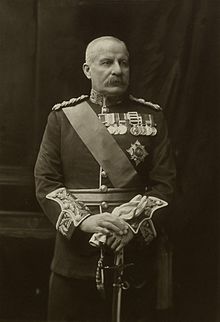Charles Egerton (Indian Army officer)
| Sir Charles Egerton | |
|---|---|

Sir Charles Egerton
|
|
| Born |
10 November 1848 Parsonstown, Ireland |
| Died | 20 February 1921 (aged 72) Christchurch, Hampshire |
| Allegiance |
|
| Service/branch |
|
| Years of service | 1867–1907 |
| Rank | Field Marshal |
| Commands held | Bannu column Frontier District British troops in British Somaliland Madras Command |
| Battles/wars |
Second Anglo-Afghan War Hazara Expedition |
| Awards |
Knight Grand Cross of the Order of the Bath Distinguished Service Order |
| Relations | Grey Egerton Baronets |
Field Marshal Sir Charles Comyn Egerton GCB, DSO (10 November 1848 – 20 February 1921) was a senior Indian Army officer from the Egerton family.
Early in his career he took part in the Second Anglo-Afghan War, the Hazara Expedition and operations in the Khyber Pass. He went on to command the Bannu column during operations in Waziristan in 1894 and to serve as senior staff officer for the in 1897. Egerton took command of the troops in British Somaliland fighting the Somalis under Mohammed Abdullah Hassan in June 1903; he had a significant success at Jidbali in January 1904 killing 1,000 of Hassan's men. His last appointment was as General Officer Commanding Secunderabad District in 1904 before retiring in 1907.
Born the third son of Major-General Caledon Egerton and Margaret Egerton (née Cumming) and educated at Rossall School and the Royal Military College, Sandhurst, Egerton was commissioned into the 31st Regiment of Foot on 9 June 1867. He immediately transferred to the 76th Regiment of Foot in India. Promoted to lieutenant on 19 October 1869, he joined the Indian Staff Corps on 11 December 1872 before being promoted to captain on 8 June 1879 on appointment to a squadron in the 3rd Punjab Cavalry.
...
Wikipedia
